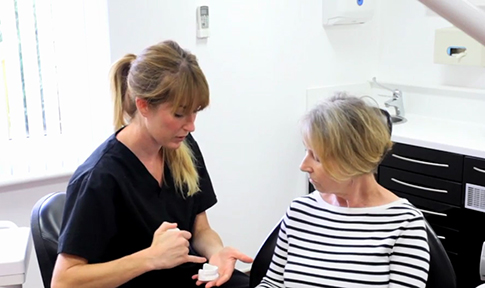How to best manage your dental needs at home!

As we all know the world has been somewhat turned on its head in the past few weeks but here at Smiles we are doing our best to keep you, our valued patients and safe as we can – unfortunately at this time, this means suspending all treatment as we do our bit by following NHS guidelines.
However! Your dental health is still as important as ever so we thought we would make this guide for you in case you do experience any dental problems while in quarantine. With all the kids at home a headache may be looming so lets do our best to keep those rotten toothaches at bay!
First things first – make sure your brushing at least twice a day! With our daily schedules out the window, for some of us, waking up at 2pm and going back to sleep at 4am may be the new norm, and that’s fine as long as you are sure to be brushing your teeth after you first meal and before you go back to bed! Remember, now is the most important time if any to look after your teeth as there are no treatments to be had if you happen to need a filling etc!
If you are unfortunate enough however to be suffering a toothache during this time, here we have put together some tips for managing at home!
Painkillers
Anti-inflammatories (like ibuprofen) can help reduce sensitivity from teeth. Combining paracetamol and Ibuprofen has also been shown to be effective. With the nation seeing a shortage of paracetamol we would like to point out that albeit superstition, there is currently no strong evidence that drugs like ibuprofen can make COVID-19 worse.
When taking painkillers please follow the instructions on the packet – taking too many tablets will not improve your symptoms and can cause serious stomach and liver injury which may be life threatening.
Toothache
If the tooth is extremely sensitive to hot or cold antibiotics will not help. The decay must be removed and filled, however under the circumstances this treatment may not be available for some time so here are some home measures that you can take that may help.
Good cleaning with fluoride toothpaste and reducing your sugar intake will hep stop decay from getting any worse.
If there is a hole in the tooth or it has cracked and is now sensitive/sharp, a temporary filling can be packed into the space. These are widely available in pharmacies, supermarkets and online.
Desensitising/sensitive toothpaste (like Sensodyne repair and protect) can help. Rub toothpaste directly on the affected area and do not rinse afterwards. Anaesthetic gel such as Orajel can help ease pain.

Wisdom Teeth
Wisdom tooth pain is usually due to inflammation of the gum over the erupting tooth, which can be worsened by trauma from biting.
Most flare ups can be managed with good home care and should settle in a few days to a week:
Excellent cleaning is vital – even if it painful to brush, the area must be kept clean to encourage healing.
Try swilling your mouth with warm water and salt regularly to help kill bacteria. Corsodyl Mouthwash is also a great aid however avoid using for more than a week as it may cause staining on the teeth.
Try maintaining a soft diet – soft food will reduce trauma from biting. Painkillers will help aid your discomfort.
If you have difficulty opening your mouth, swallowing or there is swelling in your face or cheek, call your dentist. You may need antibiotics if the infection is spreading.
Ulcers
Although painful, most ulcers heal within 7-10 days. Non-healing ulcers/oral lesions present for more than 3 weeks should be assessed by a dentist or doctor. The main thing is to keep your mouth clean to avoid infection.
Maintain Excellent cleaning even if it is painful to brush. Be gentle and use a soft bristled toothbrush. Warm salty mouthwash, painkillers and Corsodyl will also help. Use Difflam spray as needed also.

If your ulcer is being caused by a loose or rubbing denture, adhesives like Fixodent may help secure the denture. Any sharp edges can be removed using an emery board.
Lost Crown
Clean and check the crown. If the crown is mostly hollow, you can attempt to re-cement it at home if you feel comfortable to do so. simply follow these steps:
- Remove any debris from the crown, you can use something like the tip of a paperclip to scrape the old cement away. Clean your tooth thoroughly. All debris must be removed from the both the crown and the tooth for it to seat properly
- Check the crown fits without cement. Check that the bite feels correct, if the tooth feels too tall, it is not fitted correctly, double check for debris. NEVER force a crown or post onto or into your tooth, this can cause the root to fracture. If you cannot get the crown to fit, keep the tooth as clean as possible and wait to see your dentist.
- Crowns should be replaced using a dental cement from a pharmacy like Recapit. Please whatever you do, do not use Superglue!
- Once you have practised placing the crown, dry the tooth and crown, mix the cement as instructed on the packet and fill the crown. Place the crown directly onto the tooth. Bite firmly to press it in into place.
- Remove any extra cement with a toothpick and floss between your teeth to make sure that they do not stick together and voila!

If you have any other queries please do not hesitate to contact us via Facebook or phone and we will get back to you, however we truly hope that this post has helped!
Happy self-isolating! Stay home, stay safe, stay positive!






